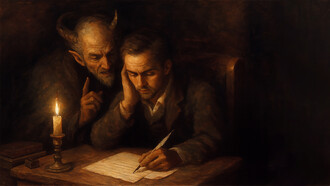Is Holden Caulfield merely a poster child for teenage angst and rebellion, or does his voice echo a deeper, more timeless yearning for authenticity in a world draped in superficiality?
In an era where depth is often drowned out by the clamour for instant gratification and surface-level appeal, J.D. Salinger's "The Catcher in the Rye" emerges not just as a tale of adolescent rebellion, but as a timeless reflection on seeking authenticity in a disingenuous world. Through the eyes of Holden Caulfield, we are invited to question not only the integrity of the adult world but also our collective cultural trajectory.
This article ventures beyond the conventional critique of Holden as a figure of youthful disillusionment, proposing instead that he embodies a profound yearning for depth and sincerity—a yearning that resonates with increasing urgency in today's society. As we learn more about Holden's world, we find ourselves confronted with a mirror, reflecting our own discomfort with the 'phoniness' that pervades not just the realms of literature and entertainment but the very fabric of our daily interactions.
Common perspectives
Holden Caulfield, the protagonist of J.D. Salinger's "The Catcher in the Rye," is often encapsulated within the narrow confines of teenage angst and rebellion by critics and readers alike. This prevailing interpretation paints Holden as a symbol of youthful disillusionment, grappling with the typical storms of adolescence. Critics argue that his cynical view of the adult world, his constant critique of "phoniness," and his inability to find his place within society are emblematic of a phase of rebellion that many teenagers go through. This perspective suggests that Holden's journey through New York City is merely an extension of his refusal to conform to the expectations of adulthood, portraying him as a character who is fundamentally at odds with the world around him due to his immaturity and angst.
Challenging the norm
However, this common interpretation misses the nuanced depth of Holden's character and the broader implications of his critique. Holden's disdain for the "phoniness" of the adult world is not merely a teenage complaint but a profound observation of the loss of authenticity and depth in society. Unlike the typical portrayal of Holden as a figure of rebellion without a cause, his narrative reveals a deeper, more reflective side. His fondness for his younger sister Phoebe, his late brother Allie, and his former teacher Mr. Antolini are not remnants of a childlike refusal to grow up but are indicative of his appreciation for genuine connections and untainted innocence.
Phoebe, in particular, represents the purity and sincerity that Holden yearns for in the world around him. She is a beacon of authenticity in a sea of pretence, embodying the qualities that Holden finds lacking in the adult world. His adoration for Phoebe underscores his not being against the world per se but against a world stripped of its sincerity and depth. This is further exemplified in his relationship with Allie, whose untimely death symbolizes the loss of innocence and goodness that Holden desperately clings to. Moreover, Holden's appreciation for meaningful conversations, as opposed to superficial small talk, reveals his quest for depth in human interactions. His narrative is not a blanket rejection of adulthood but a critique of what he perceives as its hollow core. The moments and people Holden values most are those that resonate with authenticity and depth—qualities he finds sorely lacking in the broader society.
Selling out or selling short
In "The Catcher in the Rye," Holden Caulfield's disappointment with his brother D.B.'s move to Hollywood serves as a poignant critique of the sell-out culture that prioritizes commercial success over artistic integrity. D.B.'s decision to write for Hollywood, which Holden views as a betrayal of his literary talents, mirrors a broader societal shift towards valuing immediacy and accessibility at the expense of depth and quality. This phenomenon is not confined to the entertainment industry but is symbolic of larger cultural trends that affect literature, art, and human connections.
Today's literary scene is increasingly dominated by best-selling literature that often favours simplistic narratives and language over complexity and beauty. While there is inherent value in all forms of storytelling, this shift reflects a broader cultural trend towards instant gratification—a trend that prioritizes the quick and accessible over the nuanced and challenging. The popularity of such works, while democratizing access to literature, may also signal a declining appreciation for the kind of complex, beautifully written works that require and reward deeper engagement. This trend raises questions about what is lost when immediacy is valued over the transformative power of a challenging read.
The entertainment industry, much like the scenario Holden critiques through D.B.'s career choice, increasingly favours content that guarantees commercial success, often at the expense of artistic merit. Blockbusters and franchise films dominate the box office, while independent films and those that challenge audiences intellectually or emotionally struggle for recognition and funding. This mirrors the dilemma faced by many artists and creators: the pressure to produce content that sells versus the desire to maintain artistic integrity and contribute meaningfully to cultural discourse.
Finding authenticity amidst digital noise
The rise of digital culture and social media has further exacerbated the preference for surface-level engagement. The endless scroll of social media feeds promotes a culture of consumption over contemplation, where the value of content is often measured by its ability to capture immediate attention rather than its depth or quality. This environment fosters a diminished capacity for deep engagement with complex ideas, narratives, and even with one another, leading to a superficial understanding of the world and a weakened ability to appreciate the richness of human experience.
In this context, the enduring relevance and beauty of classic literature stand as a testament to the depth and complexity that modern audiences may be missing. Classics from the Victorian era and beyond offer not just stories but experiences—invitations to worlds crafted with intricacy and care, demanding and rewarding engagement on a level that transcends the immediate. These works challenge readers to think, feel, and question, providing a counterpoint to the prevailing winds of instantaneity and superficiality.
As Holden Caulfield's journey through New York City reflects a search for authenticity in a "phoney" world, so too does our contemporary world’s call for a reevaluation of our cultural priorities. In championing the value of depth, complexity, and sincerity—whether in literature, film, or our daily interactions—we may find a path back to the richness of experience that Holden, in his own way, seeks to protect.
The purity of perspective
In "The Catcher in the Rye," characters like Phoebe Caulfield stand as vivid embodiments of authenticity and depth, their perspectives untarnished by the superficiality that pervades the adult world. Children, through their unfiltered view of life, offer a refreshing glimpse into the essence of what it means to be genuine and sincere. Their innocence, far from being a sign of naivety, emerges as a powerful lens through which the complexities and beauties of the world can be appreciated anew. This untouched innocence serves as a poignant reminder of the depth and authenticity society often sacrifices at the altar of progress. Through characters such as Phoebe, J.D. Salinger celebrates the purity of childhood as a source of truth and integrity, challenging readers to reconsider the value of these qualities in a world increasingly inclined towards the superficial.
Holden's idealism
Holden Caulfield's aspiration to be "the catcher in the rye" symbolizes a profound desire to shield this innocence from the corruption and phoniness he perceives in the adult world. This metaphor extends beyond a mere wish to protect his sister and other children; it represents a deeper yearning to preserve the authenticity and depth that innocence embodies. Holden's idealism though often misconstrued as mere cynicism or rebellion, is in fact a testament to his struggle against a society that frequently undervalues genuine human connections and experiences in favor of appearances and material success.
His vision of catching children before they fall off the cliff into adulthood is not just about saving them from physical harm but about safeguarding the purity and unspoiled perspective that define childhood. In this way, Holden's quest becomes a powerful allegory for the ongoing battle to maintain depth and authenticity in a world that seems determined to erode these values.
The catchers in our rye
In J.D. Salinger's "The Catcher in the Rye," Holden Caulfield's dream of being the "catcher in the rye" serves as a poignant metaphor for his desire to protect the innocence of childhood from the cynicism and superficiality of the adult world. This vision of standing in a field of rye, catching children before they fall off an unseen cliff, symbolizes a broader yearning to preserve purity and authenticity in a world that often values the opposite. As we ponder our own society, increasingly detached from depth and realism, it prompts us to ask: Who are the catchers in the rye of our world today?
In the vast and expanding field of contemporary culture, the true catchers in the rye are those rare individuals who steadfastly value and foster depth and "reality." They are not necessarily the loudest voices in the room, nor do they always occupy the front covers of magazines or the top spots on bestseller lists. Instead, they are the film directors, authors, musicians, and artists who dare to delve deeper, challenging us to think, feel, and question.
Directors like David Lynch and Christopher Nolan, who craft cinematic experiences that linger long after the screen goes dark; authors like Alice Walker and Markus Zusak, whose words weave complex narratives of human emotion and experience; musicians like Clint Mansell and Hans Zimmer, whose compositions touch something primal and profound within us; and singers/artists like Adele and Linkin Park, who convey authenticity and raw emotion through their music.
These individuals stand as beacons of depth in a world that often seems to skim the surface, reminding us of the power and necessity of genuine artistry and human connection. They are the catchers in the rye of our time, reaching out to save us from the cliff's edge of superficiality and disconnection.
Yet, despite the valiant efforts of these modern-day catchers in the rye, the field is indeed vast, and the catchers are alarmingly few. We can't help but acknowledge the poignant truth: we are all, in some way, on the brink of falling off the cliff into the chasm of superficiality that yawns below.















